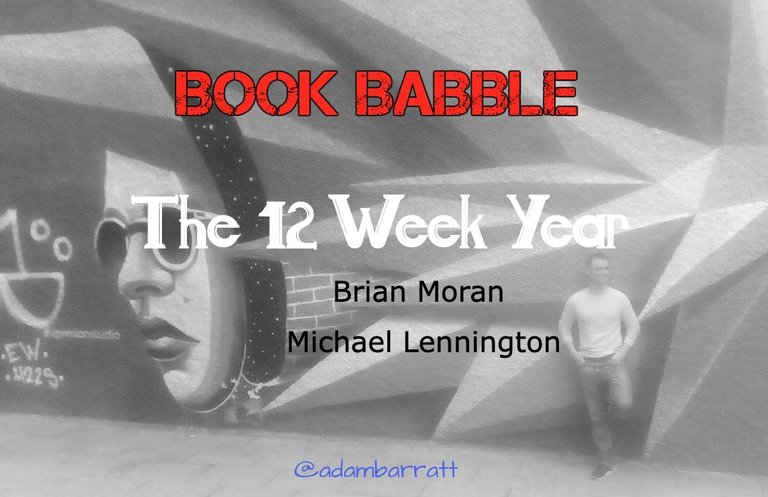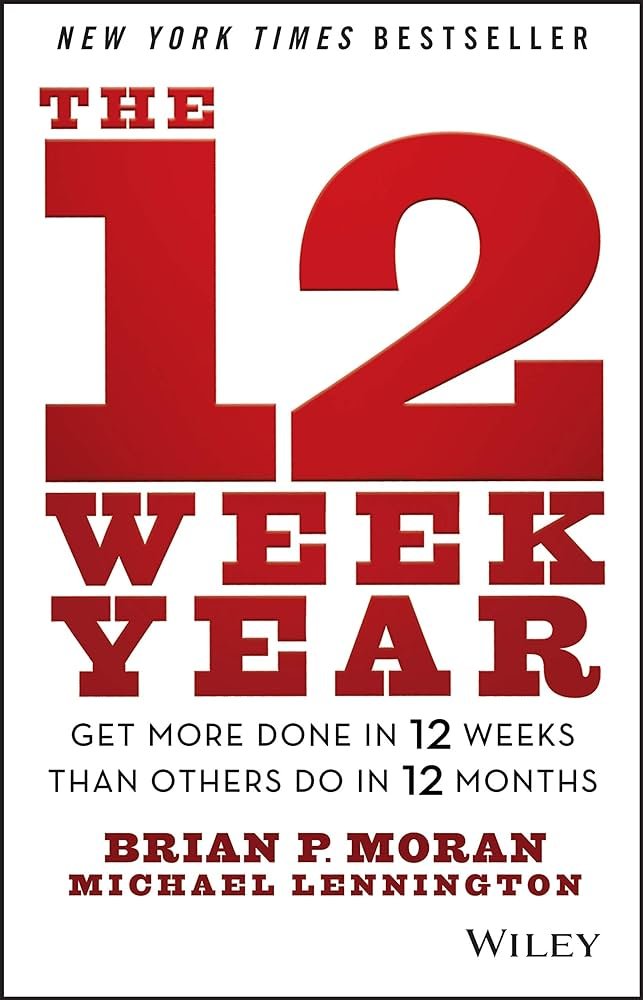"Get more done in 12 weeks than others do in 12 months"

This is a book that popped up on my radar when I was posting some book Threads and is an intriguing concept. Not completely new, but one that's distilled into book form and expanded upon.
That being treating each 12 weeks like a year. Many people may operate in 3 month increments anyway (as part of a wider picture) but this is going a step further and actually treating that 12 weeks/3 months as literally a year in itself, and you get 4 of those in a regular year.
That time pressure and organisation helps to get more things done and maintain more focus. Short enough to not be too far in the future and able to see tangible results, but a long enough period for plenty to get achieved.
I was about to buy the book on Kindle which was a bit more expensive than the norm so I held off. Meanwhile I came across the audio on YouTube and worked my way through that. I probably will get the book too and go through the text, but the concepts are quite clear and we'll go through that today.
Written by Brian Moran and Michael Lennington and as alluded to above, presents a strategy for achieving more in 12 weeks than most people do in 12 months. The idea being to shift from an annual goal-setting mindset to a shorter, more focused 12-week timeline.
Doing things this way will help to improve focus, increase productivity and lead to better results as you have that constant urgency and accountability.
As I didn't read the text version I haven't got any quotes (nor did I jot any down) so I won't have any here which I normally base the centre of the article on. But let's jump into the principles…

The 12 Week Principles
Condense the timeframe
Instead of planning for a year, break your year into 12-week chunks. This creates a sense of urgency and helps maintain focus.
Have a clear vision
Define a clear picture for what you want to achieve over the next 12 weeks. The book advocates using the SMART goal-setting method… that being Specific, Measurable, Achievable, Relevant, and Time-bound.
Plan each week
Break down your 12 week goals into weekly goals and actions. Every week, plan the specific day to day tasks that will move you closer to your objectives.
What's the score?
What gets measured gets managed. Track your progress consistently and diligently. Use a simple system to measure your performance against your goals. This could be an actual scorecard or some other method of tracking using spreadsheets, apps or just writing it down to reflect on.
Take account
Knowing you have to check in and get certain things done in particular timeframes means you're more likely to do it, and do it better. Share your goals and progress with an accountability partner, group or coach (whether that be a formal one or something less so). This could be a mentor, colleague, friend, online community etc. This all helps keep you on track, as well as get ongoing feedback.
Focus on the head domino
The domino analogy was used in the book The ONE Thing, and this is treading a similar path. Identify the core activities (lead measures) that will have the most impact on your goals. Focus on these key actions rather than getting distracted by less important tasks, known as lag measures. There are physical exercises that have the most impact on the entire body, and we're using that principle here.
Adapt & Grow
It was Darwin (allegedly) who pointed out that it's not the strongest nor the most intelligent species that survive… but those most adaptable to change. Now humans are adaptation machines, if they tap into and embrace that possibility.
Be willing and flexible to adjust your approach based on what you learn along the way. Regularly review your progress, learn from any setbacks and you'll be well on your way. And don't forget to celebrate your successes!
Speech from one of the authors, Brian Moran - source
The 12 Week Application
Get clear!
You need clarity on what you want to achieve and set definite, specific goals around that. Leave nothing to chance or wishy-washy vague desires. Make them measurable and aligned with your long-term vision.
Break them down
Divide your 12 week goals into smaller, manageable tasks. Create weekly plans that outline exactly what you need to do each week to reach your them. This brings it down to the activities that head towards reaching them.
Embrace routine
Schedule regular planning sessions to review your progress, what you've done and what you need to do. Adjust to taste if needed, and set priorities for the upcoming week.
Keep score
Develop a simple system for tracking your performance. As mentioned earlier, this could be any method that works for you, just make sure you use it and reflect on it.
Accountability partner/s
Now you need to find that person or people that can help hold you accountable. Share your goals, progress and results with them, whether that be in a professional or more casual sense.
Maintain focus & avoid distraction
Keep your mind on your key priorities. Be ruthless about saying no to tasks that don't align with your 12 week goals and know that there's a place for other important things when scheduled outside of this plan.
Review and adjust
Keep going back and checking on your progress, see how well you've performed and make those tweaks as necessary.
Rinse & repeat
After completing a 12 week cycle, start again with new goals. Continuously applying this method will help you achieve more in less time and make steady progress towards your long-term vision.
Video review by Read And Grow
Thanks Brian & Michael! Anything Else?
That about sums it all up. You can probably explain the concept and apply it through a paragraph, but where's the fun in that? It's not just a case of understanding it intellectually but having these ideas reinforced and giving us a roadmap to follow.
As mentioned in the intro, I listened to the audio rather than read the text, so I think it's worth reading the book although that depends on your preferred method and the situation.
I like the overall idea and it definitely helps in planning as your focus shifts into a way that may work better for most of us. Too often we're dangling and drifting, and this keeps us on task, and we also know we can go after another goal when this 12 weeks is over so it's not too far away or discarded completely.
Worth a read, and worth experimenting with!
Thread:
https://inleo.io/threads/view/adambarratt/re-leothreads-2ovxelqyb
First image my own, other images and videos linked to source
- 1-50: First 50 BookBabbles
- 51: THE DAILY STOIC - Ryan Holiday
- 52: MAKE TIME - Jake Knapp & John Zeratsky
- 53: GRIT - Angela Duckworth
- 54: WHAT I TALK ABOUT WHEN I TALK ABOUT RUNNING - Haruki Murakami
- 55: THE PURSUIT OF PERFECT - Tal Ben-Shahar
- 56: THE SLIGHT EDGE - Jeff Olson
- 57: CONTAGIOUS - Jonah Berger
- 58: THE RICHEST MAN IN BABYLON - George S. Clason
- 59: THE 5 AM CLUB - Robin Sharma
- 60: THINK LIKE DA VINCI - Michael Gelb
- 61: INFLUENCE - Robert Cialdini
- 62: THE ONE THING - Gary Keller
- 63: THE 12 WEEK YEAR - Brian Moran & Michael Lennington
- 64: THE POWER OF YOUR SUBCONSCIOUS MIND - Joseph Murphy
- 65: THE UNTETHERED SOUL - Michael A. Singer
- 66: ON WRITING WELL - William Zinsser
- 67: PRINCIPLES - Ray Dalio
- 68: HYPERFOCUS - Chris Bailey
- 69: THE OBSTACLE IS THE WAY - Ryan Holiday
- 70: EXTREME OWNERSHIP - Jocko Willink & Leif Babin
- 71: KNOWN - Mark Schaefer
- 72: THE LAST LECTURE - Randy Pausch
- 73: THE FIVE PEOPLE YOU MEET IN HEAVEN - Mitch Albom
- 74: FOUR THOUSAND WEEKS - Oliver Burkeman
- 75: THE ART OF TAKING ACTION - Gregg Krech
Posted Using InLeo Alpha
I find that dividing annual goals into short quarters not only helps to maintain focus, but also allows you to see results more quickly, which is super rewarding. Your summaries of the principles are very clear and helpful, especially the accountability part and the need to have a clear vision. Also, the domino metaphor is great for understanding how to focus on the actions that really matter. I'll definitely check out the book! 👍
Exactly, condenses it all whilst still being a long enough timeline to see results. It's a shift in thinking and you can incorporate it in to what works best for you. Thanks, glad you liked it!
That's an insightful book and thank you for sharing your review in our community.
Thanks!
Congratulations @adambarratt! You have completed the following achievement on the Hive blockchain And have been rewarded with New badge(s)
Your next target is to reach 7500 replies.
You can view your badges on your board and compare yourself to others in the Ranking
If you no longer want to receive notifications, reply to this comment with the word
STOP